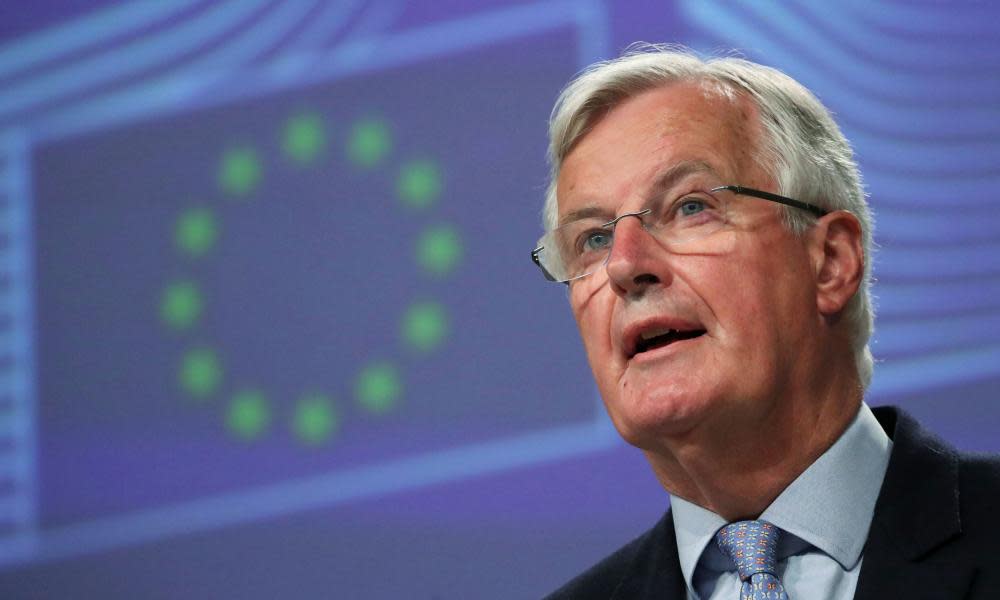Brexit: Barnier hints in talks of EU concessions on state aid rules

Michel Barnier has signalled that he is ready to drop the EU’s most contentious demand that its rules limiting government subsidies to businesses are inserted into British law after another week of stuttering negotiations over a future trade and security deal.
In a move immediately welcomed in Downing Street, the bloc’s chief negotiator declined to publicly back the EU’s opening demand that the UK incorporate Brussels’ state aid rules into its domestic legislation.
Speaking to reporters via a video conference call, Barnier said he would not “speculate where we’ll end up” on the issue. State aid rules did not form part of the discussions in the most recent talks between the two negotiating teams, he said.
When pressed on whether he was standing behind the EU’s opening position, Barnier appeared to concede that a “toolbox” would need to be devised for ensuring fair competition when it came to state aid. The demand until now has been that the EU’s rules on state aid should be incorporated in British law as they develop with the European court of justice acting as the final arbiter.
Barnier said: “We need to work together in order to come up with the appropriate toolbox, the robust commitments that we are clear about is how effective these mechanisms will be so they can ensure long-term, fair sustainable competition between the EU and the UK, but we haven’t got there yet.”
Last month the UK’s chief negotiator David Frost wrote to Barnier arguing that it was “not a provision any democratic country could sign”.
The EU negotiator warned, however, that the bloc expected the talks to go deep into October given the lack of progress so far, a timeline rejected by the British side.
A source senior source on the UK negotiating team said: “We’re not up for a long negotiation over the next months, well into the autumn where nobody knows what’s going to happen. October is too late for us”.
In an attempt to spur the talks along, London has made a veiled threat of imposing tariffs on agricultural goods such as beef, tomatoes and diary products that would have a high impact on exports from the likes of Ireland, France and Spain.
This follows Michael Gove’s declaration last month that it would be prepared to move away from the zero-tariff goal if the EU was not prepared to budge on a level playing field.
”We’d rather not,” said a senior source.
During his press conference appearance, Barnier made repeated references to the political declaration, the 27-page document agreed by Boris Johnson and the EU last year as a guide to the negotiations on the future relationship.
He accused Downing Street of backtracking on key parts of that agreement including on the joint desire to agree “robust commitments to prevent distortions of trade and unfair competitive advantages” and ensuring the continue level of cooperation to maintain existing levels of nuclear safety.
Speaking shortly afterwards, Frost rejected any suggestion that Downing Street would seek to weaken levels of safety but pointed out that the British side would not be tied to EU rules and that other vehicles for agreement would need to be found.
“Our view of the political declaration is that, as it says in the title, it is a framework. And in para three says ‘it establishes the parameters of an ambitious, broad, deep and flexible partnership’ … and we are fully committed to that vision. That doesn’t mean that everything in the declaration must go into a legally binding treaty.”
The two sides also failed to make the expected progress on fishing rights, despite spending two days discussing more than 100 shared stocks that swim in UK and EU waters, the most time given to any of the 11 negotiating topics in the latest round.
Barnier, a former French fisheries minister, accused the UK of not showing “any true will” to move beyond its starting position. The UK wants annual negotiations on fish quotas, based on a system of “zonal attachment”, meaning agreeing shares based on the percentage of fish inside each side’s exclusive economic zone (a 200-mile area round the shore). But Barnier said an annual negotiation was “not even technically possible” because of the complexity of reaching an agreement on so many fish.
But while voicing disappointment over the failure to reach a deal on fisheries by 1 July, as both sides had promised, he indicated the EU was willing to compromise. “The EU wants the status quo, the UK wants to change everything. If we want an agreement we have to discuss somewhere in between these positions. We are prepared to discuss what needs to be discussed.”

 Yahoo News
Yahoo News 
